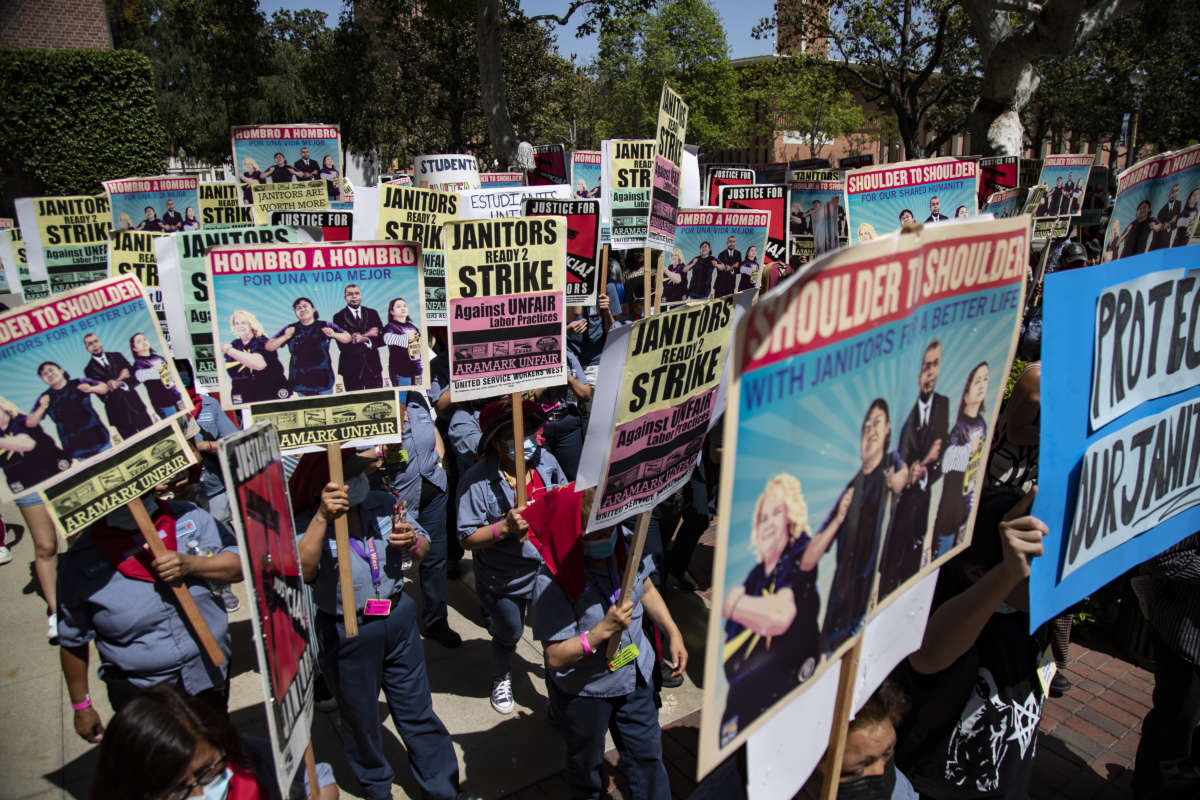Welcome to DU!
The truly grassroots left-of-center political community where regular people, not algorithms, drive the discussions and set the standards.
Join the community:
Create a free account
Support DU (and get rid of ads!):
Become a Star Member
Latest Breaking News
Editorials & Other Articles
General Discussion
The DU Lounge
All Forums
Issue Forums
Culture Forums
Alliance Forums
Region Forums
Support Forums
Help & Search
Labor History Belongs to Us All: New Book Explores Forgotten Heroes of Movement 'Fighting Like Hell'

- SEIU members who work for Aramark and USC protest for better benefits and pay during contract negotiations on April 7, 2022, on the campus of University of Southern California in Los Angeles, California.
_______
- Truthout, April 10, 2022.
First as a reporter covering the American heavy metal scene, and now as a dogged independent journalist and organizer, Philadelphia-based author Kim Kelly has cultivated a distinct and unabashedly radical voice reporting on labor, politics and culture over the past decade. Kelly’s revelatory new book, "Fight Like Hell: The Untold History of American Labor," expands on her reporting as a labor columnist for Teen Vogue — where she covers everything from strike explainers to the need for class solidarity to Appalachia’s history of labor militancy. The book chronicles the working-class heroes who were pushed to the margins or simply left out of American labor history.
Kelly shows how many of the labor protections we take for granted now were born from the blood, sweat and tears of thousands of Black workers, immigrant workers, queer workers, disabled and incarcerated workers, and working women who fought, sometimes outside of the traditional bounds of labor organizing, for their right to make a living for themselves and generations to come. “We were not ‘given’ our rights. It is not even ‘we took our rights.’ Instead, we created our rights,” said Gerardo Reyes, a farmworker and Coalition of Immokalee Workers member-organizer who is quoted in Fight Like Hell.
Truthout spoke with Kelly right before she and other staffers at Condé Nast, which includes Teen Vogue, announced they were forming a company-wide union. In this interview, Kelly discusses how her organizing with the VICE union in 2015 sparked her interest in labor; writing her book and navigating history that isn’t clear-cut; and the universality of labor stories and struggles. - Amy Qin: Fight Like Hell is about women, Black workers, undocumented immigrants, sex workers and those on the margins of society who have been omitted from the history of labor or relegated to footnotes despite their immense contributions. In what ways have their stories been forgotten in our public history of the labor movement?
- Kim Kelly: There are a number of labor books out there, and some of them are great, and really instrumental in my research for this book. But most of the characters and main figures in those books are white, because those are the people who have been in power. The victors get to tell the stories and the people that generally are in a position to record these stories, and who are seen as the sort of authorities on this history, were maybe not paying as much attention to what Black southern women were up to, or what Indigenous miners were up to, or what was happening in the coal fields. There’s this selective history at work — you’re never going to find the full story in any book. I’ve worked really hard to get a lot of those stories into this book, but there’s still tons of stuff that I had to leave out... https://truthout.org/articles/labor-history-belongs-to-us-all-new-book-explores-forgotten-heroes-of-movement/
_______
- 'Appalachia’s Long, Proud Tradition of Labor Militancy.' Aug. 15, *2019. No Class is an op-ed column by writer and radical organizer Kim Kelly that connects worker struggles and the current state of the American labor movement with its storied — and sometimes bloodied — past. This week she goes deep on Appalachia's rich labor history.
Harlan County, Kentucky, may be one of labor’s most hallowed battlegrounds. Its soil has been soaked in the blood of union men and women time and time again since the early 20th century, when major labor disputes between miners and greedy mine operators roiled the area. Now, almost a century after the infamous Battle of Blair Mountain in neighboring West Virginia, one of the biggest and bloodiest class war uprisings in U.S. history, suffering Appalachian coal miners have taken matters into their own hands once again. On July 29, about 50 coal miners in Cumberland, Kentucky, banded together to stop a moving train. They blocked the tracks, refusing to allow the train, carrying $1 million worth of coal, to pass, according to Newsweek. They did the same thing the next day, and the next — literally putting their bodies on the line. Their protest began because Blackjewel, the company where they had until recently been employed, filed for bankruptcy...https://www.teenvogue.com/story/why-harlan-county-kentucky-miners-blockading-coal-trains
InfoView thread info, including edit history
TrashPut this thread in your Trash Can (My DU » Trash Can)
BookmarkAdd this thread to your Bookmarks (My DU » Bookmarks)
0 replies, 797 views
ShareGet links to this post and/or share on social media
AlertAlert this post for a rule violation
PowersThere are no powers you can use on this post
EditCannot edit other people's posts
ReplyReply to this post
EditCannot edit other people's posts
Rec (4)
ReplyReply to this post